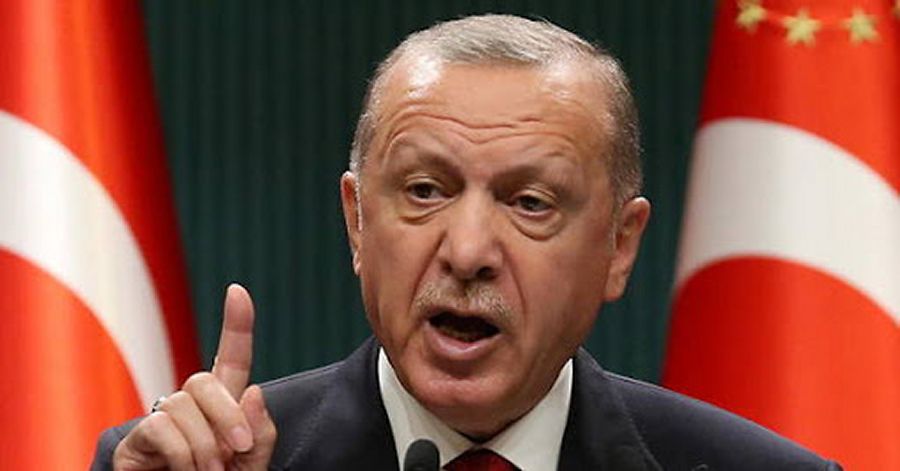WILL TURKEY GO OUT OF ERDOGANISM ? | |
By voting in the presidential elections for Recep Tayyip Erdogan and in the legislative elections for the parties of the Popular Alliance formed around him and his formation the AKP (Party of Justice and Development), they will support the consolidation of an autocratic regime. implementing a repressive national-Islamist policy. The other option is to vote for the return to democracy, the rule of law and the parliamentary system. The leader of the Republican People's Party (CHP, republican, social democrat and secular) Kemal Kiliçdaroglu embodies this second option, which would mean the end of Erdoganism, a regime tailor-made for the power of one man. For the first time, a very broad coalition – the Table of Six, gathered around the CHP, is united against Erdogan and his regime. Will this be enough to put an end to a system whose construction began twenty years ago? Erdogan's hardening The gradual slide towards autocracy began after the 2011 legislative elections. Victorious for the third time in the general elections, Recep Tayyip Erdogan, prime minister since 2003, then began to praise a presidential system that would allow him to "run the country like a limited company" and "make decisions as soon as possible". In 2014, for the first time, the President of the Republic must be elected by universal suffrage. Erdogan gets elected and declares that from now on “the regime has become, in fact, presidential”. The coup attempt of July 15, 2016 and the state of exception that followed gave him the opportunity to transform this state of fact into a state of law. Thanks to the support of the far-right MHP party, a new and essential ally of the AKP to retain the majority in Parliament, the presidential regime was narrowly ratified (51.4%) in April 2017, after a referendum marred by irregularities. An elective and repressive autocracy, without separation of powers, based on a nationalist-religious ideology, a chaotic economic policy and an aggressive and opportunistic foreign policy was thus put in place. The economic successes of yesteryear have given way to a serious crisis marked by very high inflation, chaotic growth and the vertiginous depreciation of the Turkish lira. The earthquakes of February 6, 2023, which caused tens of thousands of deaths, revealed all the weaknesses of the system put in place: the negligence of the institutions, the consequences of hypercentralization and nepotism in the administration, the results of the authorizations granted for electoral purposes to buildings that do not comply with anti-seismic standards… It is in this context that Turkey entered the electoral campaign. An opposition finally united Erdogan, losing popularity and for the first time in a defensive position, had to widen the coalition formed with the extreme right – the Popular Alliance – towards very minority parties claiming radical Islamist fundamentalism. Facing him, a coalition formed on the eve of the June 2018 elections, the Alliance of the Nation, expanded to other parties and became, in February 2022, the "Table of Six". The first experience of forming an anti-Erdogan united front had yielded convincing results during the 2019 municipal elections. Building on this success, the leader of the CHP, Kemal Kiliçdaroglu, imposed on his party an aggiornamento to form alliances with conservative parties. The Table of Six, or the Alliance of the Nation, therefore brings together the CHP, the Good Party (nationalist right formed in part by dissidents of MHP), two liberal and conservative parties created by dissidents of the AKP, and a party which represents historical Islamism and is very critical of the corruption and nepotism of the AKP. These six parties nominated Kiliçdaroglu as their candidate for the presidential election. The left-wing pro-Kurdish party HDP (People's Democratic Party), which represents the majority of Kurdish voters in Parliament (the Kurdish population is estimated at around 18%), as well as the various currents of the left, have also called for a vote for him. Seeing this danger of a united front coming, Erdogan had nevertheless taken care beforehand to have the very popular mayor of Istanbul, Ekrem Imamoglu (CHP), elected in 2019, removed from the presidential race, by having him sentenced in December 2022 to two years and seven months in prison for “insulting” certain senior regime officials. The Head of State hoped to see the Table of Six tear itself apart in the search for its presidential candidate and finally break up. His strategy failed and the broad consensus achieved around a single anti-Erdogan candidate changed the traditional political context in which the latter used to maneuver easily. A ballot that looks like a referendum for or against Erdogan Since Erdogan's shift towards religious and authoritarian nationalism at the beginning of the 2010s, one of the major axes of his political strategy has been to stir up ethnic (Turkish-Kurdish), confessional (Sunni-Alevis) and cultural ( modernists-conservatives) who work society. He placed himself as the natural leader of the Turkish sociological majority, Sunni and conservative, accusing the representatives of the opposition of being "dividers of national and confessional unity", "the extension of terrorist organizations" or agents foreign powers with designs on Turkey. The expression "authentic and national" became his leitmotif to qualify the actions of his government. But the composition of the parties that form the Table of Six around Kiliçdaroglu, the support of the Kurdish movement and leftist movements and the serious economic crisis have blurred his strategy. The divide between supporters and opponents of Erdogan seems likely to overdetermine the outcome of the May 2023 elections. With a personality diametrically opposed to that of Erdogan, Kilicdaroglu is positioning himself as a "quiet force" in this electoral campaign and has succeeded in creating real electoral momentum in recent weeks. It responds to the aspiration of a large part of the population for a return to tranquillity, to a certain democratic normality and to more rational, less chaotic and unpredictable economic policies, for example with regard to interest rates than Erdogan pushed below 10% as inflation nears 100%. For its part, the HDP, despite the almost daily repression and discrimination it suffers, succeeded in forming an alliance with small left-wing parties for the legislative elections. And to short-circuit the sword of Damocles of a dissolution by the Constitutional Court on the eve of the election which has weighed on him for two years, he took the decision to stand for election under the colors of another party, the Green Left Party. This alliance, which does not present a presidential candidate and calls for a vote for Kilicdaroglu in the first round, will also have a decisive role to play in the future assembly. The support of its elected officials will probably be necessary to form a parliamentary majority with the Nation Alliance. The common denominator of all these new rapprochement movements is their desire to end Erdogan's twenty-year rule, to return to parliamentary rule through constitutional change, to restore the rule of law and fundamental rights and freedoms, to put an end to arbitrariness, nepotism, corruption and the use of religion as an active political instrument, and finally to restore the confidence of international economic actors and to relaunch negotiations with the EU, which had stalled for several years. And after the elections? If the opposition wins these elections, the task of getting out of the system bequeathed by Erdoganism will be immense, and in any case Turkey will not quickly become a peaceful democracy. We can only hope that this great moment of democratic effervescence will not be temporary, as has been the case several times in the past. On the other hand, in the event of a new victory for Erdogan and the AKP, Turkey will for a long time be engulfed in the camp of populist autocracies and authoritarian national-capitalism. Hopes for a possible exit from the autocracy through elections will be weakened. What if the opposition wins but Erdogan does not recognize the election results or if the legal system he has put in place announces contrary results? This question is of course in the minds of all opposition voters in Turkey. But apart from organizing a large civil mobilization to ensure the security of the ballot and doing hard work to convince reluctant voters to vote for change, all opposition parties are unanimous in not talking about this dark hypothesis before the elections. First, so as not to frighten voters with such a scenario of chaos, for the moment hypothetical, and thus dissuade them from going to vote; then, because it is impossible and above all counterproductive to talk today about the means and methods of fighting against such a coup which would mean that Erdogan will have crossed the Rubicon and will have embarked on the path of an assumed dictatorship Such as. The opposition first aspires to win the elections at the ballot box; it will be time, then, to take the necessary measures so that the popular will is respected. Article by Ahmet Insel, published in The Conversation. Economist, political scientist, professor emeritus at Galatasaray University, University of Paris 1 Panthéon-Sorbonne Ahmet Insel is a founding member of the Green Left Party in Turkey created in 2012. | |
| Steven Colton for DayNewsWorld | |
 |
|




